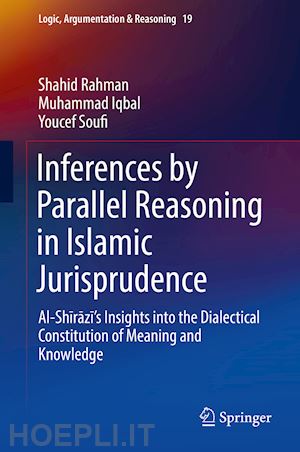
Questo prodotto usufruisce delle SPEDIZIONI GRATIS
selezionando l'opzione Corriere Veloce in fase di ordine.
Pagabile anche con Carta della cultura giovani e del merito, 18App Bonus Cultura e Carta del Docente
This monograph proposes a new (dialogical) way of studying the different forms of correlational inference, known in the Islamic jurisprudence as qiyas. According to the authors’ view, qiyas represents an innovative and sophisticated form of dialectical reasoning that not only provides new epistemological insights into legal argumentation in general (including legal reasoning in Common and Civil Law) but also furnishes a fine-grained pattern for parallel reasoning which can be deployed in a wide range of problem-solving contexts and does not seem to reduce to the standard forms of analogical reasoning studied in contemporary philosophy of science and argumentation theory.
After an overview of the emergence of qiyas and of the work of al-Shirazi penned by Soufi Youcef, the authors discuss al-Shirazi’s classification of correlational inferences of the occasioning factor (qiyas al-'illa). The second part of the volume deliberates on the system of correlational inferences by indication and resemblance (qiyas al-dalala, qiyas al-shabah). The third part develops the main theoretical background of the authors’ work, namely, the dialogical approach to Martin-Löf's Constructive Type Theory. The authors present this in a general form and independently of adaptations deployed in parts I and II. Part III also includes an appendix on the relevant notions of Constructive Type Theory, which has been extracted from an overview written by Ansten Klev. The book concludes with some brief remarks on contemporary approaches to analogy in Common and Civil Law and also to parallel reasoning in general.
1. Introduction.- 2. Qiyas Al-?Illa.- 3. Qiyas Al-Dalala and Qiyas Al-Shabah.- 4. Immanent Reasoning and the Dialogical Constitution of Logic.
Shahid Rahman: Full-professor (classe exceptionnelle) of logic and epistemology at the Université de Lille-Nord-pas-de-Calais, Sciences Humaines et Sociales. He is also researcher at the UMR-CNRS 8163: STL. . Member (2016-2018) of the Conseil Scientifique du Réseau national des Maisons des Sciences de l’Homme. Member of the commission of the Institute Eric Weil, Director (for the French side) of the ANR-DFG Franco-German project 2012-2015 (Lille (MESHS)/Konstanz, Prof M. Armgardt): Théorie du Droit et Logique/Jurisprudenz und Logik. Studies: Masters in Philosophy, Mathematics, Philology (Erlangen-Nürnberg Universität) 1986-1989; PhD in Philosophy, Psychology, Philology , thesis on dialogical logic and constructive mathematics, 1990-1993; Habilitation in Philosophy (for the grade of professor), Universität des Saarlandes, 1994-1997. Professional Experience: Wissenschatlicher Mitarbeiter, Universität des Saarlandes, 1996-98. Researcher at the Max-Planck Institut für Informatik and at the Deutsches Forschungszentrum für Künstliche Intelligenz 1997-2000. Acting Director of the Department of Philosophy, Universität des Saarlandes, 1999. Prof. Rahman works span both philosophy of logic and its history, including a dialogical perspective on Constructive Type Theory. In fact, he is the leading researcher in the field of the dialogical conception of logic to which he contributed with publications in, among other fields, non-classical logics, legal reasoning, Aristotle, Arabic Logic and Epistemology.
Muhammad Iqbal: Lecturer at Universitas Islam Negeri Antasari, Banjarmasin Indonesia. PhD student in philosophy at the UMR-CNRS 8163:STL., Université de Lille-Nord-pas-de-Calais, Sciences Humaines et Sociales. His main interests are, Islamic Law, Logic and Epistemology.
Soufi Youcef: Lecturer at the Department of Classical, Near Eastern, and Religious Studies, University of British Columbia, BUCH C206, 1866 Main Mall, Vancouver,Canada. His interests are: Islamic Law, Islamic Legal Theory (U?ul al-fiqh), Medieval Juristic Disputations.










Il sito utilizza cookie ed altri strumenti di tracciamento che raccolgono informazioni dal dispositivo dell’utente. Oltre ai cookie tecnici ed analitici aggregati, strettamente necessari per il funzionamento di questo sito web, previo consenso dell’utente possono essere installati cookie di profilazione e marketing e cookie dei social media. Cliccando su “Accetto tutti i cookie” saranno attivate tutte le categorie di cookie. Per accettare solo deterninate categorie di cookie, cliccare invece su “Impostazioni cookie”. Chiudendo il banner o continuando a navigare saranno installati solo cookie tecnici. Per maggiori dettagli, consultare la Cookie Policy.